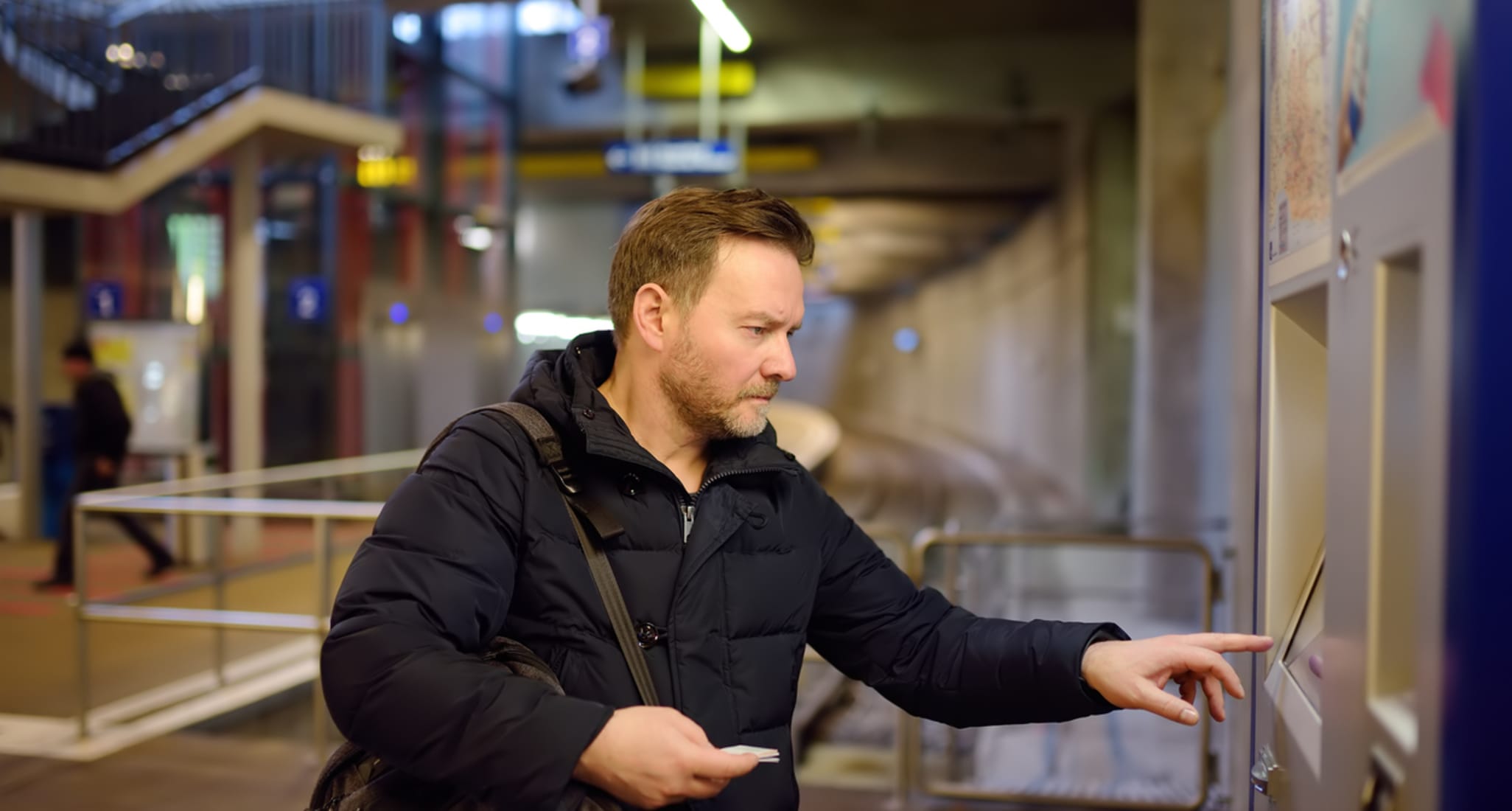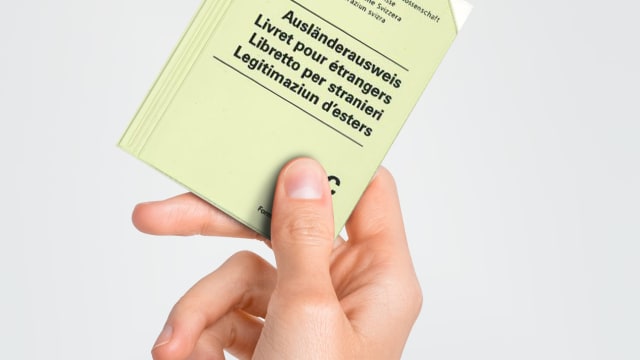Public transport in Switzerland: costs for tickets and travelcards
Public transport in Switzerland: what tickets are available? How much do tickets and travelcards cost? Can I travel with my dog or bicycle? Comparis explains what you need to know.

19.02.2024

iStock/SbytovaMN
1. How does public transport work in Switzerland?
Public transport in Switzerland is divided into four sub-areas:
International traffic: the Swiss Federal Railways (German abbreviation: SBB) works with foreign partners internationally.
Long-distance transport: long-distance transport connects large cities with other cities and airports. The SBB runs most of these routes with InterRegio and InterCity trains.
Regional passenger transport: regional transport connects different places in a region. Various transport associations are usually responsible for this.
Local traffic: trams or buses often service towns and villages.
You need a Swisspass to access many different offers and travelcards. This is a kind of customer card for public transport that you can manage your travelcards and tickets with.
You can also benefit from partner offers with a Swisspass. These include, for example, the car-sharing service Mobility and public bicycles.
2. Swiss railways: ticket overview
You need a ticket for your entire journey when travelling in Switzerland. You can get tickets from a Swiss Federal Railways office or from the regional transport association. Tickets are available:
At the counter and at ticket machines.
On the SBB website.
Via the SBB mobile app.
From the transport association (online, via mobile phone or at the counter).
Alongside normal tickets, you can also get supersaver tickets on the website and in the app. Supersaver tickets are only valid for the booked connection. They are available from six months before the date of travel until one hour before departure.
A standard ticket is valid for any train type. This means the ticket is valid on both InterCity and regional trains. You just need to note which class you have booked.
Good to know: are you travelling within Switzerland on a German ICE or French TGV train? If so, you don’t need to buy an additional ticket for this train. A standard ticket will suffice.
“Easy Ride” by SBB
The SBB offers what is known as “Easy Ride” in the mobile app. This lets you “check in” before getting on the train, and then “check out” once you have reached your destination. You don’t have to specify your route in advance.
If you use Easy Ride several times a day, the app will calculate the cheapest total cost. As an example, imagine taking the tram through Zurich several times in one day. Rather than multiple single tickets, the app will instead charge you for a day pass.
Day tickets in Switzerland
If you take several trips per day, you may want to purchase a day pass. You can get day passes for the entire railway network either directly from the SBB or from your municipality.
You can also get Saver Day Pass tickets from the SBB website or the app. However, these tickets are limited. You usually have to book them well in advance.
Saving tip: many transport associations offer a 9 a.m. day ticket. This is cheaper than regular day tickets and lets you travel freely in the selected zones from 9 a.m. onwards.
Day tickets are valid for the day of travel until 5 a.m. the next day. There is one exception: the Zürcher Verkehrsverbund. With this company you can use your day ticket 24 hours after validation or purchase.
3. Public transport travelcards in Switzerland
Do you travel a lot by public transport? Then a travelcard is usually worthwhile. Travelcards are available for:
Individual routes.
“Modules”: these are different zones plus routes.
A transport association, such as the Zürcher Verkehrsverbund (ZVV) or the Berner Libero.
Saving tip: many transport associations offer a “9 a.m. pass”. This travelcard allows you to use public transport from 9 a.m. during the week. The travelcard is valid all day at the weekend and is cheaper than a regular travel association travelcard.
Alternatively, you can buy a multiple-journey ticket. This allows you to use the ticket for a fixed number of trips or days. You must validate your ticket before each trip.
The GA Travelcard
If you often travel long distances through Switzerland, a GA Travelcard may be worthwhile.
The GA Travelcard is valid for most public transport in Switzerland. You can find the different pricing models for the GA Travelcard in the table below.
| GA travelcard type | For whom? | Price for second class in CHF | Price for first class in CHF |
|---|---|---|---|
| GA travelcard adults |
|
|
|
| Seniors travelcard |
|
|
|
| Travelcard for passengers with disabilities | Passengers with disabilities. |
|
|
| Travelcard for people living in the same household | People living with someone who owns a travelcard. |
|
|
| Family travelcard | Family members with the same place of residence. The maximum age for children is 25. The children must be single. One parent must have a standard travelcard. |
|
|
Source: SBB, as of January 2024. All GA Travelcards have a minimum term of six months.
There is also a monthly travelcard. It doesn’t renew automatically, so you can buy it for a single month at a time. It costs:
440 francs in second class.
695 francs in first class.
Scope of validity
Where a travelcard is valid is often referred to as the travelcard area of validity. This includes all public transport in Switzerland, Liechtenstein, Konstanz and Domodossola. There are some exceptions:
Ships on certain lakes.
Mountain railways for tourists.
Areas where your travelcard isn’t valid will instead often have discounts. This includes the train to Jungfraujoch, for example.
Swiss Half Fare Travelcard
The Half Fare Travelcard is a discount card for public transport in Switzerland. It gives a 50% discount on tickets. This discount may be lower on local transport networks and on mountain railways.
You can also buy the Half Fare Travelcard if you live outside Switzerland. You’ll need to do an ID check if you don’t already have a Swisspass. You can find more information on the SBB website.
The Half Fare Travelcard PLUS
As of December 2023, the SBB has been offering the Half Fare Travelcard PLUS. With this travelcard, you pay a certain amount of money in advance. You then have the amount you paid plus a bonus for ticket purchases available for 12 months afterwards.
The SBB offer the following prices for adults:
| Your payment in CHF | SBB bonus in CHF | Ticket balance in CHF | |
|---|---|---|---|
| Half Fare Travelcard PLUS 1000 | 800 | 200 | 1000 |
| Half Fare Travelcard PLUS 2000 | 1’500 | 500 | 2,000 |
| Half Fare Travelcard PLUS 3000 | 2,100 | 900 | 3,000 |
Source: SBB, as of January 2024
Any unused balance will be returned to you after 12 months. This does not apply to the bonus. The standard Half Fare Travelcard is not integrated into the PLUS. You need to buy it separately.
4. Offers for children and young people
Tickets for children and adolescents are usually cheaper than for adults. This also applies to travelcards.
Children under the age of six generally travel free of charge on public transport. This applies regardless of whether they are travelling alone or with another person.
Children and young people between the ages of six and 16 generally travel at a reduced rate. This means you pay half price for SBB tickets. The discount may be lower on local transport and mountain railways.
Children and young people also have a range of offers and travelcards available to them.
Co-Travelcards
There are two different Co-Travelcards for children:
Junior Travelcard: with the Junior Travelcard, children and young people up to the age of 16 can travel free of charge with their parents. There is a condition, however: their parent must have a valid ticket. This travelcard costs 30 francs per year for both parents and child.
Children’s Co-Travelcard: the Children’s Co-Travelcard works like the Junior Travelcard. However, children and young people can ride with adults other than their parents. The Children’s Co-Travelcard costs 30 francs per year per accompanying person and child.
Day tickets and GA travel area
A child’s day ticket is valid for an entire day in the entire GA area of validity. It costs 19 francs in second class and 33 francs in first class.
There is also a travelcard for children and young people up to 16 years. This travelcard is significantly cheaper than for adults.
Youth Half Fare Travelcard
Similar to the Half Fare Travelcard for adults, there is also a Half Fare Travelcard for teenagers. This costs 120 francs in the first year, and 100 francs for each following year.
Travelcards for young adults
There are different travelcard offers available for young people:
| GA travelcard type | For whom and validity | Price for second class in CHF | Price for class in CHF |
|---|---|---|---|
| Night GA Travelcard |
The scheduled departure time determines if your ticket is valid (your journey must start at 7pm or after). If travelling after midnight, the day you arrive determines until when your ticket is valid: 5am for weekdays, 7am for weekends and public holidays. |
99 per year | – |
| Half Fare Travelcard for Youth | People from 16 to 24 years of age. |
|
|
| GA Travelcard for 25 year olds | 25 year olds. |
|
|
| Family travelcard | Family members with the same place of residence. The maximum age for children is 25 years. The children must be single. One parent must have a standard travelcard. |
|
|
Source: SBB, as of January 2024. All travelcards have a minimum term of six months. There is one exception: the Night GA Travelcard.
The Half Fare Travelcard PLUS
The Half Fare Travelcard PLUS for under-25s works analogously to the PLUS for adults. However, you don’t need to pay as much:
| Your payment in CHF | SBB bonus in CHF | Ticket balance in CHF | |
|---|---|---|---|
| Half Fare Travelcard PLUS 1000 | 600 | 400 | 1,000 |
| Half Fare Travelcard PLUS 2000 | 1,125 | 875 | 2,000 |
| Half Fare Travelcard PLUS 3000 | 1,575 | 1,425 | 3,000 |
Source: SBB, as of January 2024
5. Dogs and bicycles on public transport
SBB: dog tickets
Are you travelling with a dog? If so, your dog needs their own ticket. An exception applies if the dog’s shoulder height is less than 30 centimetres and the dog is in a box or bag. There are four types of dog tickets available.
Point-to-point tickets: you can get your dog a second class ticket at half fare cost. The easiest way to do this is to add your dog to your ticket under “edit travellers” when getting your ticket. This may differ depending on where you bought your ticket and if you already have a ticket or not.
Day tickets: 25 francs
Monthly ticket: 60 francs
Annual pass: 350 francs
Your dog can use the entire GA area of validity with one ticket.
Important: the annual pass is linked to a specified person’s Swisspass. If another person travels with the dog, they must buy a separate ticket.
SBB: bicycle tickets
You need a separate ticket for bicycles. The options include:
Bicycle point-to-point ticket.
Bike day card. It’s also available as a multi-day ticket.
Annual bike pass: an annual pass for your bike integrated into your Swisspass.
Depending on the length of your route, either the point-to-point ticket or a day ticket may be cheaper. Check before you buy.
From March to October, you sometimes need a reservation for your bike on InterCity trains. This will cost you extra. Find out whether you need to reserve a bicycle spot before starting your trip.
This article was first published on 29.08.2022



